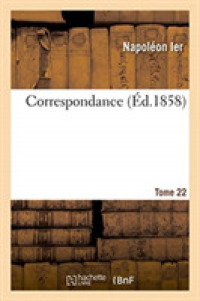- ホーム
- > 洋書
- > 英文書
- > Politics / International Relations
Full Description
The Internet is a hub for gathering political information and accounts for significant political activity; however, social interactions online are often disrupted by trolling. As digital democracy continues to evolve, understanding trolling is crucial for developing strategies to foster a healthier online environment conducive to democratic engagement. Understanding the objective of posting deceitful, inflammatory content is crucial.
Trolling Democracy offers both academic and practical insights into one of the most pressing challenges of the digital age. By leveraging theoretical insights, empirical evidence from new surveys, and innovative experiments, J. Benjamin Taylor and Sean Richey offer a comprehensive understanding of trolling's effect on the public sphere and its implications for democratic processes. Furthermore, they address the broader societal concerns raised by the proliferation of trolling, including the spread of misinformation, the erosion of trust in online platforms, and the exacerbation of political polarization.
Enhancing our knowledge of trolling by bridging gaps in previous research and proposing new avenues for future study, Taylor and Richey equip us with the tools to counteract its negative effects more effectively.
Contents
1. The Impact of Trolling on Democracy 2. Deliberative Democratic Theory and Trolling 3. Who are the Victims of Online Harassment and Trolling? 4. Need for Chaos Scale: Psychological Determinants of Internet Trolling 5. Nonpsychological Predictors of Trolling 6. Identifying Trolling and Trolls Online 7. The Effect of Trolling on Down-the-Line Behaviors 8. Conclusion: Trolling, Deliberative Democracy, and the Path Forward. Appendix








